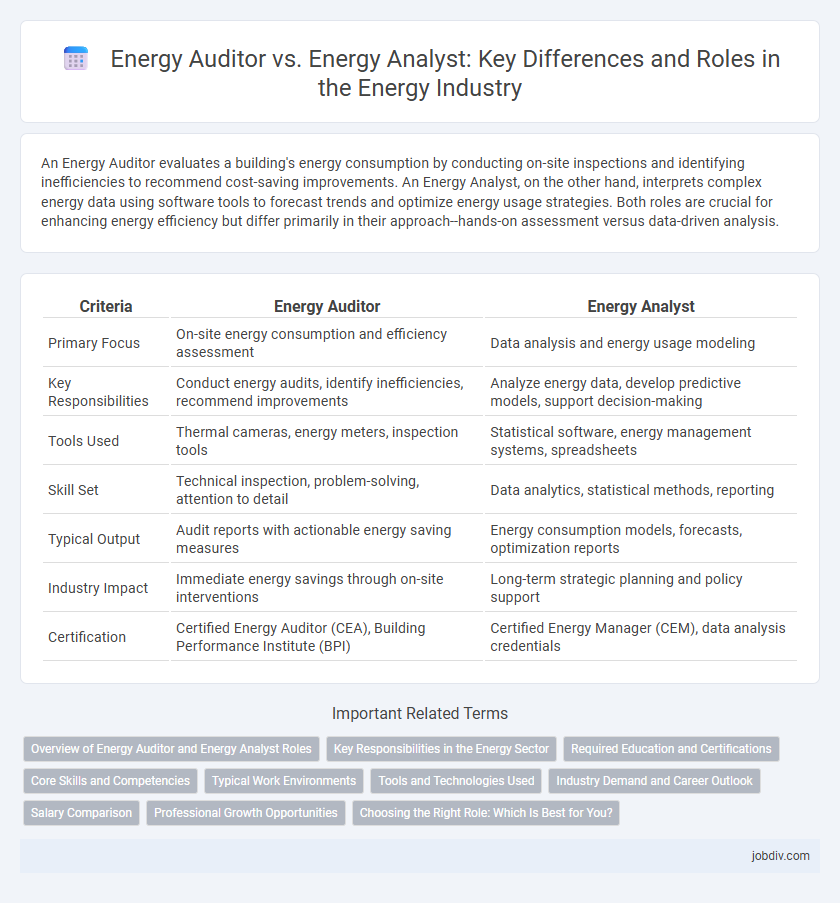An Energy Auditor evaluates a building's energy consumption by conducting on-site inspections and identifying inefficiencies to recommend cost-saving improvements. An Energy Analyst, on the other hand, interprets complex energy data using software tools to forecast trends and optimize energy usage strategies. Both roles are crucial for enhancing energy efficiency but differ primarily in their approach--hands-on assessment versus data-driven analysis.
Table of Comparison
| Criteria | Energy Auditor | Energy Analyst |
|---|---|---|
| Primary Focus | On-site energy consumption and efficiency assessment | Data analysis and energy usage modeling |
| Key Responsibilities | Conduct energy audits, identify inefficiencies, recommend improvements | Analyze energy data, develop predictive models, support decision-making |
| Tools Used | Thermal cameras, energy meters, inspection tools | Statistical software, energy management systems, spreadsheets |
| Skill Set | Technical inspection, problem-solving, attention to detail | Data analytics, statistical methods, reporting |
| Typical Output | Audit reports with actionable energy saving measures | Energy consumption models, forecasts, optimization reports |
| Industry Impact | Immediate energy savings through on-site interventions | Long-term strategic planning and policy support |
| Certification | Certified Energy Auditor (CEA), Building Performance Institute (BPI) | Certified Energy Manager (CEM), data analysis credentials |
Overview of Energy Auditor and Energy Analyst Roles
Energy Auditors perform detailed on-site assessments to evaluate energy consumption patterns and identify opportunities for efficiency improvements in buildings and industrial processes. Energy Analysts focus on interpreting energy data, utilizing software tools and statistical models to forecast energy trends and support strategic decision-making. Both roles are critical for optimizing energy use, reducing costs, and promoting sustainability in various sectors.
Key Responsibilities in the Energy Sector
Energy Auditors primarily focus on conducting detailed assessments of buildings and facilities to identify energy inefficiencies, performing on-site inspections, and recommending cost-saving measures based on energy consumption data. Energy Analysts analyze large datasets from energy systems and market trends to forecast consumption patterns, optimize resource allocation, and support strategic energy planning. Both roles contribute to energy conservation goals but differ in their emphasis on hands-on evaluation versus data-driven analysis.
Required Education and Certifications
Energy Auditors typically require a background in engineering, environmental science, or energy management, often holding certifications such as Certified Energy Auditor (CEA) from the Association of Energy Engineers (AEE). Energy Analysts generally possess degrees in data science, economics, or environmental engineering and may hold certifications like Certified Energy Manager (CEM) or LEED credentials for sustainability analysis. Both roles demand specialized education and industry-recognized certifications to ensure expertise in energy efficiency assessments and data-driven energy solutions.
Core Skills and Competencies
Energy Auditors specialize in on-site energy consumption assessments, leveraging skills in thermal imaging, utility data analysis, and building system evaluations to identify inefficiencies. Energy Analysts focus on interpreting energy data trends, using advanced analytical tools, software modeling, and statistical methods to forecast energy usage and recommend optimization strategies. Both roles require strong knowledge of energy codes, regulatory compliance, and sustainability principles to effectively drive energy efficiency projects.
Typical Work Environments
Energy auditors typically work on-site in commercial, industrial, or residential buildings to assess energy consumption and identify efficiency improvements, often spending significant time performing physical inspections and measurements. Energy analysts are more commonly found in office settings, where they analyze energy data, model energy usage, and develop optimization strategies using specialized software tools. Both roles may collaborate with utility companies, government agencies, and consulting firms, but their work environments reflect a blend of fieldwork and data-driven analysis.
Tools and Technologies Used
Energy auditors utilize specialized diagnostic tools such as thermal imaging cameras, blower doors, and data loggers to assess building performance and identify energy inefficiencies. Energy analysts primarily rely on software platforms like EnergyPlus, RETScreen, and HOMER to model energy consumption patterns and simulate optimization scenarios. Both professionals integrate IoT devices and smart metering technologies to gather real-time data for accurate energy assessments and strategic recommendations.
Industry Demand and Career Outlook
Energy auditors and energy analysts both play critical roles in optimizing industrial energy efficiency, but industry demand increasingly favors energy auditors due to the growing emphasis on regulatory compliance and cost reduction. Energy auditors conduct comprehensive onsite inspections to identify energy-saving opportunities, which directly support industries facing tighter environmental standards, driving higher immediate demand for these professionals. Energy analysts rely on data modeling and predictive analytics to forecast energy usage trends, positioning themselves for long-term strategic planning roles, but current market trends show stronger hiring growth within the energy auditing sector.
Salary Comparison
Energy auditors typically earn an average salary ranging from $50,000 to $70,000 annually, reflecting their role in assessing energy use and recommending efficiency improvements. Energy analysts, with specialized skills in data modeling and market analysis, command higher salaries, often between $70,000 and $100,000 per year. Salary differences stem from the analytical complexity and market impact of energy analysts compared to the technical assessment responsibilities of energy auditors.
Professional Growth Opportunities
Energy auditors gain practical expertise by conducting on-site assessments, leading to certifications such as Certified Energy Auditor (CEA) that enhance credibility and open doors to management roles. Energy analysts develop advanced skills in data modeling, forecasting, and energy market trends, which can lead to strategic advisory positions and higher-level roles in policy development or consulting firms. Both career paths offer growth through specialization, but analysts typically advance toward roles requiring strong analytical proficiency and policy impact.
Choosing the Right Role: Which Is Best for You?
Energy auditors specialize in on-site inspections and detailed assessments of energy consumption to identify inefficiencies and recommend cost-saving measures. Energy analysts focus on data interpretation, modeling, and forecasting energy trends to support strategic decision-making and policy development. Choosing the right role depends on whether you prefer hands-on technical evaluations or analytical data-driven insights within the energy sector.
Energy Auditor vs Energy Analyst Infographic

 jobdiv.com
jobdiv.com